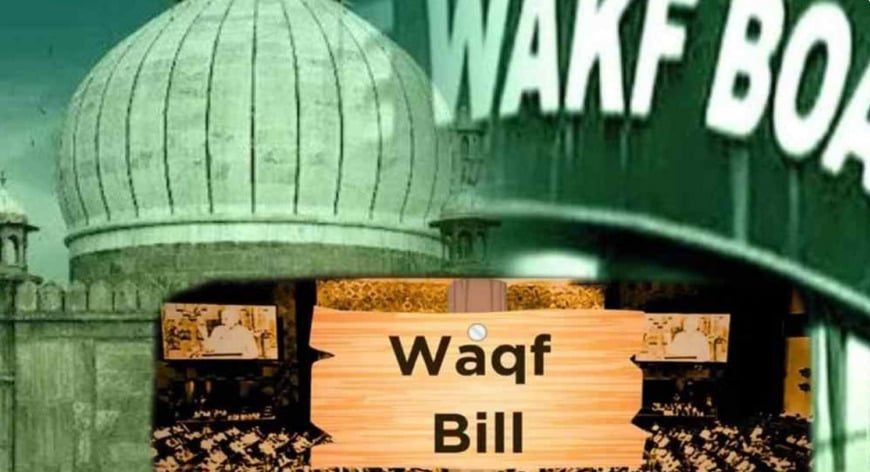The Waqf Amendment Bill will make major changes in the Waqf Act of 1995. What are the claims of the government regarding the new Waqf law? What are its benefits and losses for Muslims? What does Waqf mean? Where has this word ‘Waqf’ come from? What is his total property? What is the new definition of Waqf in the Waqf Amendment Bill? Let’s learn about all those things.
Waqf Amendment Bill
Whatever will be in Parliament on 2 and 3 April 2025 regarding the Waqf Amendment Bill, its roots are on 8 August 2024. The government has brought two bills in the budget session called after the Narendra Modi government 3.0. The first bill is Waqf Amendment-2024. And the second bill is the Muslim Waqf (Relations) Bill-2024. Both these MLAs have been brought to the Lok Sabha. The government had said that through this bill, proper management of Waqf properties will be done. There will also be ease of tasks.
1. What does Waqf mean?
Such assets are called Waqf. In which reservation has been kept for religious and charitable works. In Islamic law, these assets are used only for religious and charitable purposes. These assets are not used for other purposes. The property is called Waqf because it does not owe a particular person. Now it is in the name of Allah. Once a property is declared Waqf, no person has any right over him.
2. History of Waqf in India
The history of Waqf in India begins with the era of Delhi Sultanate. The then Sultan Muhammad Gauri named two villages after the Jama Masjid in Multan. At the same time, the responsibility of its maintenance was entrusted to Sheikh-ul-Islam, the famous religious scholar of the Islamic world. The development of Waqf properties continued in India with the expansion of Delhi Sultanate and subsequent Islamic dynasties.
3. How much property is the name of Waqf?
In today’s situation, the Waqf Board has the third largest property in the country after the Indian Railways and the Indian Army. At present, the Waqf Board controls about 8 lakh 70 thousand properties across the country. These properties are spread on about 9 lakh 40 thousand acres of land. Its estimated cost is 1 lakh 20 thousand crore rupees. India has the highest number of Waqf properties in the world.
4. Waqf claims and concerns
What are the arguments of the government?
1. The Waqf Amendment Bill 2024 will make some major changes in the Waqf Act 1995. This will change the current structure of management and administration of Waqf properties in India. The government is calling it reform. Therefore, the opposition and many Muslim organizations are calling it intervention in religious matters.
2. After the new amendment, the definition and registration process of Waqf will change completely. Also, it has been claimed to increase the role of technology in the management of Waqf record. The government claims that this will bring uniformity, transparency and accountability in the functioning of the Waqf Board.
3. At the same time, the real objective of the Muslim Waqf (Relations) Bill, 2024 is to cancel the Muslim Waqf Act, 1923. The government has described it as a bill of the colonial era and said that it is not only old but also insufficient for managing Waqf properties in modern India.
However, now the Modi government does not have a majority as before in Parliament. Therefore, he had to pursue the matter only after consulting his coalition partners. After some objections of the opposition and coalition partners, the government sent it to JPC, a joint committee of Parliament. After some changes, this bill is now being re -introduced in Parliament.
Opposition’s arguments
1. Organizations associated with opposition parties and Muslims say that the new law is being brought for unconstitutional and political purpose. Other Muslim organizations, including All India Personal Law Board, objected to ensuring the presence of two non-Muslims in the Waqf Board. It has also been made mandatory for Muslim members to have two women members.
2. Asaduddin Owaisi said that Waqf property is private. Whereas after this law, the government can consider it as government property. He claims that Waqf properties cannot be registered without documents. And if there is no registration, then the government will confiscate those properties.
3. MP Imran Masood says that the property which is not disputed and is not government will remain Waqf. But the Uttar Pradesh government has declared 11,500 hectares of land in the name of Waqf as government property. According to the new law, it will now be registered as government property. Imran Masood has objected to this.
4. There is also a dispute about DM’s powers. After the new amendment, the decision on the property or land claimed by both the government and the Waqf Board depends on the discretion of the DM. If the DM considers that property as government property, then it will become government property forever. Apart from this, the right to survey the Waqf Board will also end. Board will not be able to claim new properties by conducting survey.
Provisions that are less controversial
1. Some people object to setting up separate boards for Bohra and Aga Khani communities besides Shia and Sunni communities.
2. The decision of the Waqf Board Tribunal was considered to be final in the event of dispute. But now an appeal can also be made against its order in the High Court within 90 days. The High Court can take its decision on this.
The Post Waqf Bill 2024: Waqf Amendment Bill will benefit Muslims or loss? First appeared on News India Live | Breaking India News, The Indian Headline, India Express News, Fast India News.
